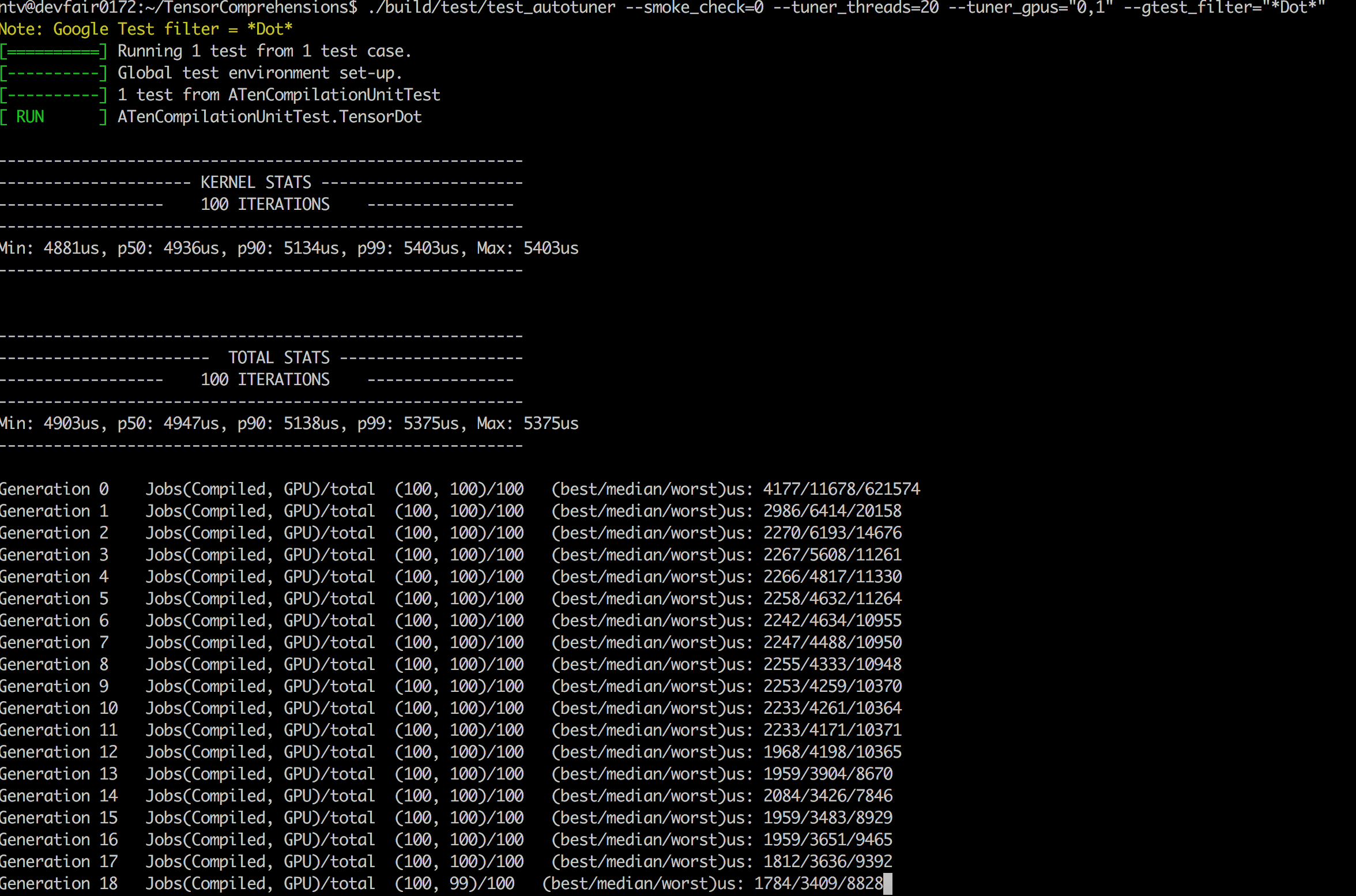Tensor Comprehensions (TC) is a fully-functional C++ library to automatically synthesize high-performance machine learning kernels using Halide, ISL and NVRTC or LLVM. TC additionally provides basic integration with Caffe2 and pybind11 bindings for use with python. We provide more details in our paper on arXiv.
This library is designed to be highly portable, machine-learning-framework agnostic and only requires a simple tensor library with memory allocation, offloading and synchronization capabilities.
For now, we have integrated TC with the Caffe2 and ATen tensor libraries.
The following illustrates a short but powerful feature of the library: the capacity to JIT-compile high-performance machine learning kernels on demand, for specific sizes.
#include <ATen/ATen.h>
#include "tc/aten/aten_compiler.h"
#include "tc/core/mapping_options.h"
// 1. Define and setup the TC compilation unit with CUDA memory management backed by ATen.
std::string tc = R"TC(
def TensorDot(float(N, C1, C2, H, W) I0, float(N, C2, C3, H, W) I1) -> (O) {
O(n, c1, c3, h, w) +=! I0(n, c1, c2, h, w) * I1(n, c2, c3, h, w)
})TC";
// 2. Allocate tensors with random data
at::Tensor I0 = at::CUDA(at::kFloat).rand({32, 512, 8, 28, 28});
at::Tensor I1 = at::CUDA(at::kFloat).rand({32, 8, 2, 28, 28});
std::vector<at::Tensor> outputs;
// 3. Run autotuning with evolutionary search starting from a naive option
auto options = tc::MappingOptions::makeNaiveMappingOptions();
auto bestOption = autotune(cacheFilename, tc, "TensorDot", {I0, I1}, options, {options});
// 4. Compile and run the TC with the best option.
tc::ATenCompilationUnit atCompl;
atCompl.define(tc);
auto handle = atCompl.compile("TensorDot", {I0, I1}, bestOption);
atCompl.run("TensorDot", {I0, I1}, outputs, handle);
// 5. Perform precision checks against an ATen reference implementation
check({I0, I1}, outputs, [&I0, &I1](){ return ...; });After a few generations of autotuning on a 2-GPU P100 system, we see results resembling:
We have not yet characterized the precise fraction of peak performance we obtain but it is not uncommon to obtain 80%+ of peak shared memory bandwidth after autotuning. Solid register-level optimizations are still in the work but TC in its current form already addresses the productivity gap between the needs of research and the needs of production. Which is why we are excited to share it with the entire community and bring this collaborative effort in the open.
You can find documentation here which contains instructions for building TC via docker, conda packages or in non-conda environment.
- GitHub issues: bug reports, feature requests, install issues, RFCs, thoughts, etc.
- Slack: For discussion around framework integration, build support, collaboration, etc. join our slack channel https://tensorcomprehensions.herokuapp.com/.
See the CODE_OF_CONDUCT.md file for more details.
Tensor Comprehensions is distributed under a permissive Apache v2.0 license, see the LICENSE file for more details.
See the CONTRIBUTING.md file for more details.

